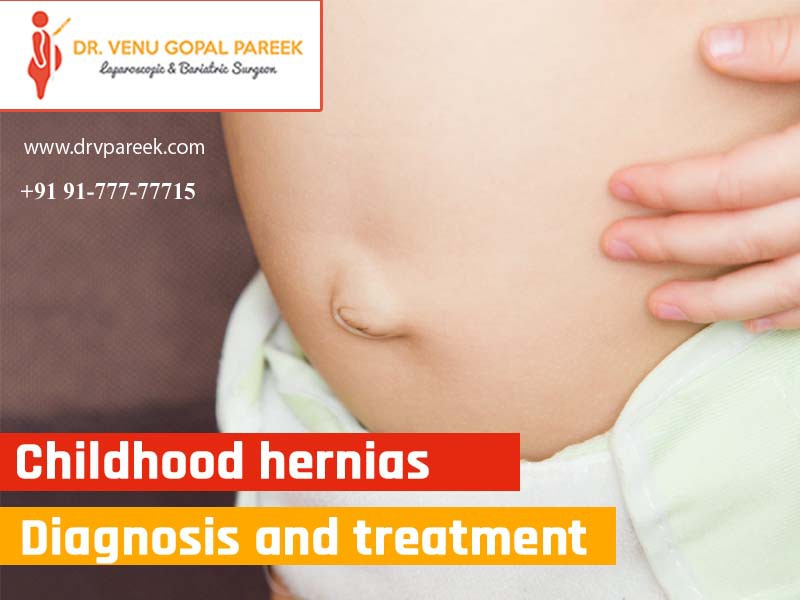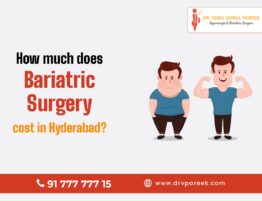
Hernias are a common problem. This causes a localized bulge in the abdomen or groin. It is often harmless and painless, but sometimes it can cause discomfort and pain. Did you know that nearly one-third of hernias occur in children within their first six months? This is common, especially in premature babies.
The most common type of hernia in children is the umbilical and inguinal hernia. In this article, you can see what a hernia is, hernias’ common causes, and how they are treated in children.
What are hernias in children?

A hernia occurs when part of the intestine pushes out from a weak spot in the abdominal muscles. A hernia creates a soft lump or lump under the skin.
In children, hernias often occur in one of two locations:
- Groin area:- This is known as an inguinal hernia.
- Around the navel:- This is known as an umbilical hernia.
What causes a hernia in children?

Babies can develop hernias within the first few months of life. This is due to a weakness in the abdominal muscles. Inguinal and navel hernias occur for slightly different reasons.
During pregnancy, all babies have an area called the inguinal canal. It goes from the abdomen to the genitals. In boys, testicles move through this channel from the abdomen to the scrotum, where the testicles are located. A baby’s groin usually closes just before or after birth. However, in some cases, the channel does not close completely. Then the intestinal chain can move through the weak point in the abdominal wall to the groin. This causes an inguinal hernia. Most inguinal hernias occur in boys.
When the baby is growing in the womb, there are small holes in the abdominal muscles. This opening is closed after birth. But sometimes, these muscles don’t close completely, and a small hole remains. The intestine loops get pushed into the gap between the abdominal muscles resulting in an umbilical hernia.
Which children are at risk of developing a hernia?

Hernias are more common in children who have one or more of the following risk factors:
- Early or premature birth
- If the parent or a sibling suffered from a hernia when they were a baby
- The presence of cystic fibrosis
- The presence of hip dysplasia, a condition that appears at birth
- Boys with undescended testicles, this means that the testes did not move into the scrotum before birth.
- Problems with your urinary or reproductive organs
Inguinal hernia
This type of hernia is more common in children with the below conditions:
- Have a family history of inguinal hernias
- Who has other problems with urination or reproductive organs?
- This type of hernia is more common in the right groin than on the left. But it can happen on both sides.
Umbilical hernia
This type of hernia is more common in:
- African-American children
- Premature babies
What are the symptoms of a hernia in a child?

Hernias are common in newborns. However, you may not notice a hernia until weeks or months after giving birth.
However, in both cases of hernia, swelling may be easier to spot if your baby cries, coughs, or is straining to have a bowel movement. This can diminish or disappear as your baby relaxes. Often, if your child’s health care provider pinches this knot while the child is calm and lying down, the knot will shrink and return to the stomach.
In some cases, you can’t push the hernia back into theabdomen . Then the arch of the intestine can get caught at the weak point of the abdominal muscles. In this case, the following symptoms may appear:
- The abdomen is distended.
- Stomach aches and pains
- Vomit
- Fussiness
- Redness or discolouration near the hernia
- Fever
If a blocked intestine is not treated, the blood supply to that part of the intestine may become clogged. This is an emergency service.
Symptoms of a hernia can appear like any other health problem. Talk to Dr Venu Gopal Pareek about the diagnosis.
How is the diagnosis of an inguinal hernia done for a child?

Your child’s health care provider can diagnose an inguinal hernia through a physical exam. The doctor will see if they can gently push the hernia back into the stomach. This is known as a diminished hernia. The provider may order an abdominal x-ray or ultrasound to examine the intestines more closely. This will most likely happen if it can’t be pushed back into the stomach.
Does the baby’s hernia go away on its own?
Umbilical hernias in children may not always need treatment, but inguinal hernias will not go away independently. If left untreated, a hernia can grow and cause life-threatening complications.
Hernias can cause additional problems if the affected organ loses blood supply. Due to a lack of oxygen, the body begins to die.
Avoid further delays! Call Dr Venu Gopal Pareek today to get adequate care for your child.
How are hernias treated in children?

Treatment will depend on your child’s symptoms, age and general health. It also depends on how severe the condition is.
What Are The Treatment Options For Inguinal Hernia?
Surgery is needed to treat inguinal hernias. This is corrected surgically as soon as it is discovered because the intestines can get stuck in the inguinal canal. In this case, the blood supply to the intestine can be interrupted, and the intestine damaged. Inguinal hernia surgery is usually done before this injury can occur.
Your child will be sedated during the hernia surgery. A small incision is made in the hernia area, and the intestinal loop is placed back in the abdominal cavity. The muscles are then sewn together. However, this is rare even among teenagers.
Hernia surgery is usually a fairly straightforward procedure. Children with inguinal hernias that are surgically recovered can often go home the same day they have surgery. After the hernia closes spontaneously or surgically, it is unlikely to recur.
Umbilical hernia

In most cases, umbilical hernias close by themselves by the time the child is one year old. Nearly all umbilical hernias close without surgery by the time the child is five years old. Therefore, there are differences of opinion about when to undergo surgery for an umbilical hernia.
In most cases, your child’s health care provider may suggest surgery if an umbilical hernia:
- It gets more prominent with age
- It cannot be pushed back into the stomach
- Is it still there after three years?
Always contact your doctor to find out what is best for your child.
Your child will be sedated during umbilical hernia surgery. A small incision is made in the navel, and the intestinal loop is placed back in the stomach. The muscles are then stitched together. Sometimes a piece of mesh is used. This will help strengthen the areas where the muscles are recovering.
Children who have had umbilical hernia surgery may be able to go home the same day.
Conclusion:
Hernia treatment is a short procedure with a short recovery period that usually does not require an overnight hospitalization unless otherwise noted. You don’t need to worry because your child will be able to resume normal daily activities as usual within a week or sooner.
For more information on treatment based on your child’s health, contact Dr Venu Gopal Pareek at 091777 77715 and book your appointment.







